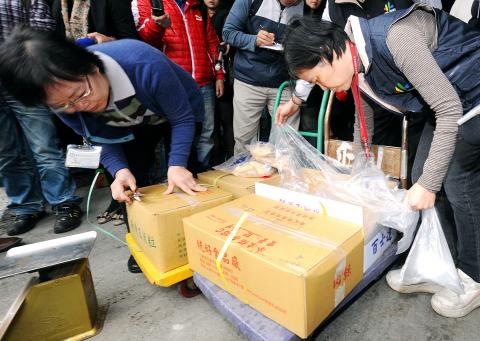People First Party (PFP) caucus whip Thomas Lee (李桐豪) yesterday urged the Chinese Nationalist Party (KMT) government to stop what it says is a propaganda campaign surrounding its policy to allow conditional imports of US beef containing residues of the feed additive ractopamine.
The Government Information Office (GIO) on Monday produced 250,000 leaflets and fliers to explain what ractopamine is, why the government plans to ease the import ban and the benefits the policy would bring the country.
Local governments and KMT lawmakers are responsible for handing out 10,000 copies, 100,000 copies were distributed with newspapers yesterday, while the rest will be distributed in magazines.

Photo: AFP
“Is the government a sales representative for a ractopamine producer? It should not use public funds to advertise the safety of a drug when its use is still banned in Taiwan,” Lee said, adding that his party was “extremely angry” that the government had mobilized public resources to “brainwash people.”
He asked the government to present a detailed account of how much the campaign has cost the legislature.
“We urge President Ma Ying-jeou (馬英九) to exert restraint, to avoid further irregularities and abuse of power. Now that he has shown himself incapable of ensuring the health of the public by withstanding pressure to lift the ban, he has to abide by a resolution approved by the legislature,” Lee said.
Lawmakers have approved a resolution asking the government not to lift the ban without the legislature’s consent before June, as legislators prioritize a revision to the Act Governing Food Sanitation (食品衛生管理法) on the use of ractopamine in animal feed, a resolution that Premier Sean Chen (陳冲) agreed to.
Lee said his party would resort to all possible measures to boycott the government and asked the Control Yuan to hold to account the government officials responsible for the propaganda if the administration continues with the policy.
In response to the criticism, GIO Minister Philip Yang (楊永明) said the office has a responsibility to explain the government’s policies to the public.
Through the leaflets and fliers, the GIO is providing the public with information so that people can understand the importance of the issue from various points of view, Yang said.
Chen, meanwhile, reiterated yesterday that the government has no timetable for the lifting of the ban on the import of US beef containing ractopamine.
The remark came a day after Ma called a high-level meeting on the issue in which he reportedly said the US beef issue needs to be resolved as soon as possible to facilitate the resumption of Taiwan-US trade talks.
Ma has definitely not set a timetable for lifting the ban, the premier said.
Now that the government has decided on a policy direction that conditionally allows imports of beef containing ractopamine residues, communication with the public will continue to promote understanding of the policy, he added.
Chen was referring to an announcement made by the Executive Yuan on March 5 that it is leaning toward lifting the ractopamine ban based on the principles of “allowing a safe level of ractopamine in beef, separating the permits for importing beef and pork, clearly labeling beef imports and excluding imports of internal organs.”
Additional reporting by CNA

CHAOS: Iranians took to the streets playing celebratory music after reports of Khamenei’s death on Saturday, while mourners also gathered in Tehran yesterday Iranian Supreme Leader Ayatollah Ali Khamenei was killed in a major attack on Iran launched by Israel and the US, throwing the future of the Islamic republic into doubt and raising the risk of regional instability. Iranian state television and the state-run IRNA news agency announced the 86-year-old’s death early yesterday. US President Donald Trump said it gave Iranians their “greatest chance” to “take back” their country. The announcements came after a joint US and Israeli aerial bombardment that targeted Iranian military and governmental sites. Trump said the “heavy and pinpoint bombing” would continue through the week or as long

TRUST: The KMT said it respected the US’ timing and considerations, and hoped it would continue to honor its commitments to helping Taiwan bolster its defenses and deterrence US President Donald Trump is delaying a multibillion-dollar arms sale to Taiwan to ensure his visit to Beijing is successful, a New York Times report said. The weapons sales package has stalled in the US Department of State, the report said, citing US officials it did not identify. The White House has told agencies not to push forward ahead of Trump’s meeting with Chinese President Xi Jinping (習近平), it said. The two last month held a phone call to discuss trade and geopolitical flashpoints ahead of the summit. Xi raised the Taiwan issue and urged the US to handle arms sales to

State-run CPC Corp, Taiwan (CPC, 台灣中油) yesterday said that it had confirmed on Saturday night with its liquefied natural gas (LNG) and crude oil suppliers that shipments are proceeding as scheduled and that domestic supplies remain unaffected. The CPC yesterday announced the gasoline and diesel prices will rise by NT$0.2 and NT$0.4 per liter, respectively, starting Monday, citing Middle East tensions and blizzards in the eastern United States. CPC also iterated it has been reducing the proportion of crude oil imports from the Middle East and diversifying its supply sources in the past few years in response to geopolitical risks, expanding

Pro-democracy media tycoon Jimmy Lai’s (黎智英) fraud conviction and prison sentence were yesterday overturned by a Hong Kong court, in a surprise legal decision that comes soon after Lai was jailed for 20 years on a separate national security charge. Judges Jeremy Poon (潘兆初), Anthea Pang (彭寶琴) and Derek Pang (彭偉昌) said in the judgement that they allowed the appeal from Lai, and another defendant in the case, to proceed, as a lower court judge had “erred.” “The Court of Appeal gave them leave to appeal against their conviction, allowed their appeals, quashed the convictions and set aside the sentences,” the judges